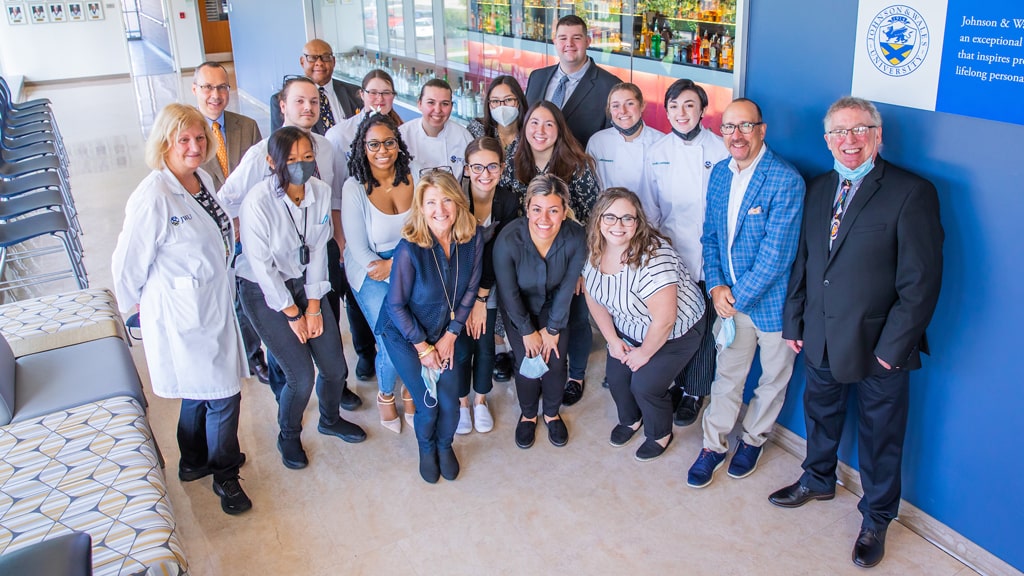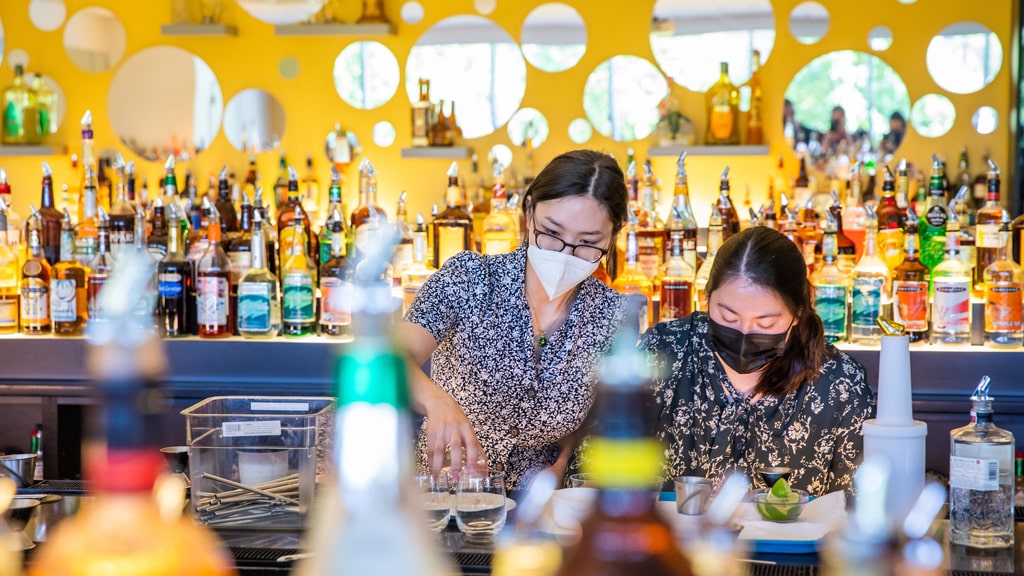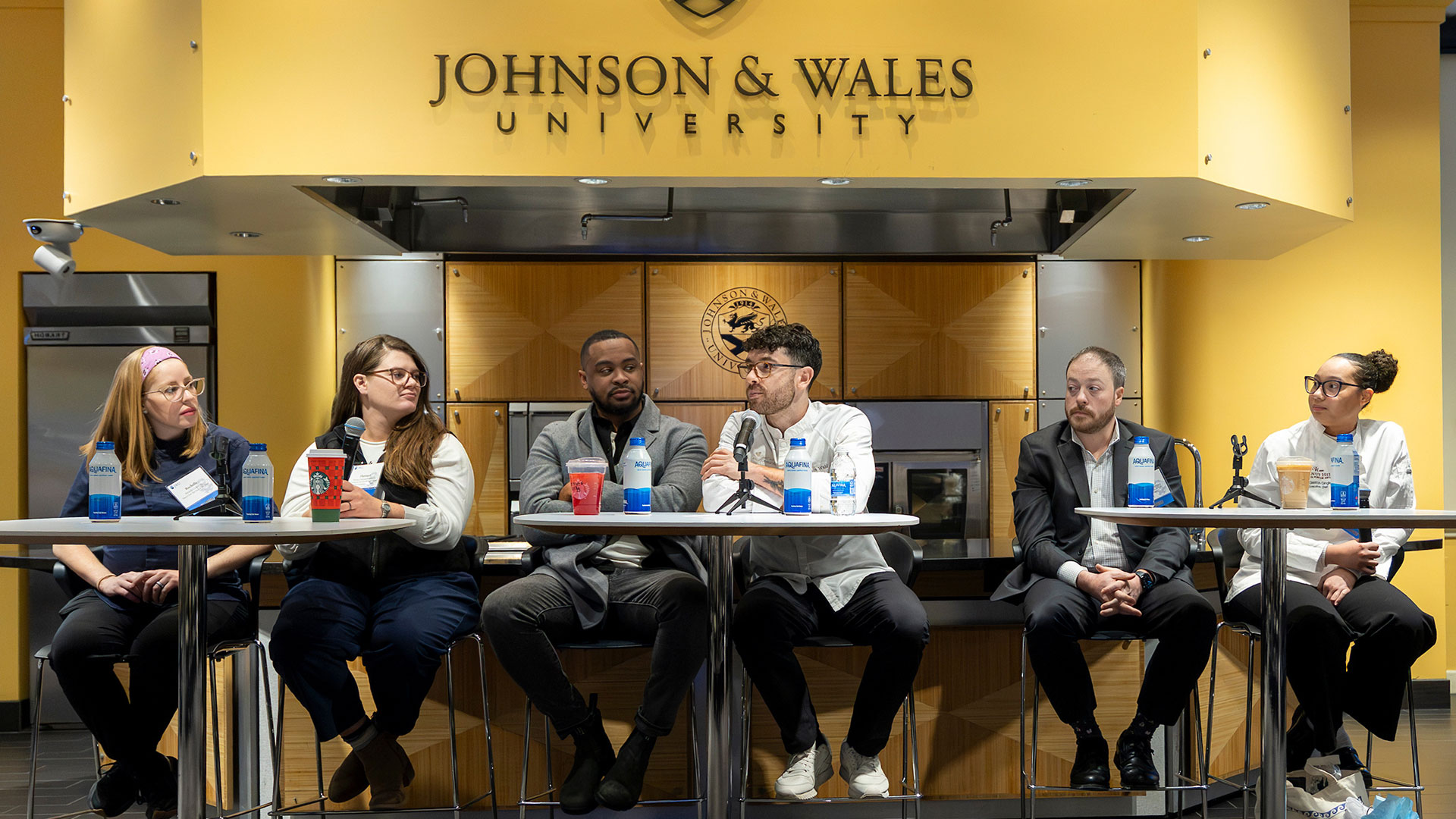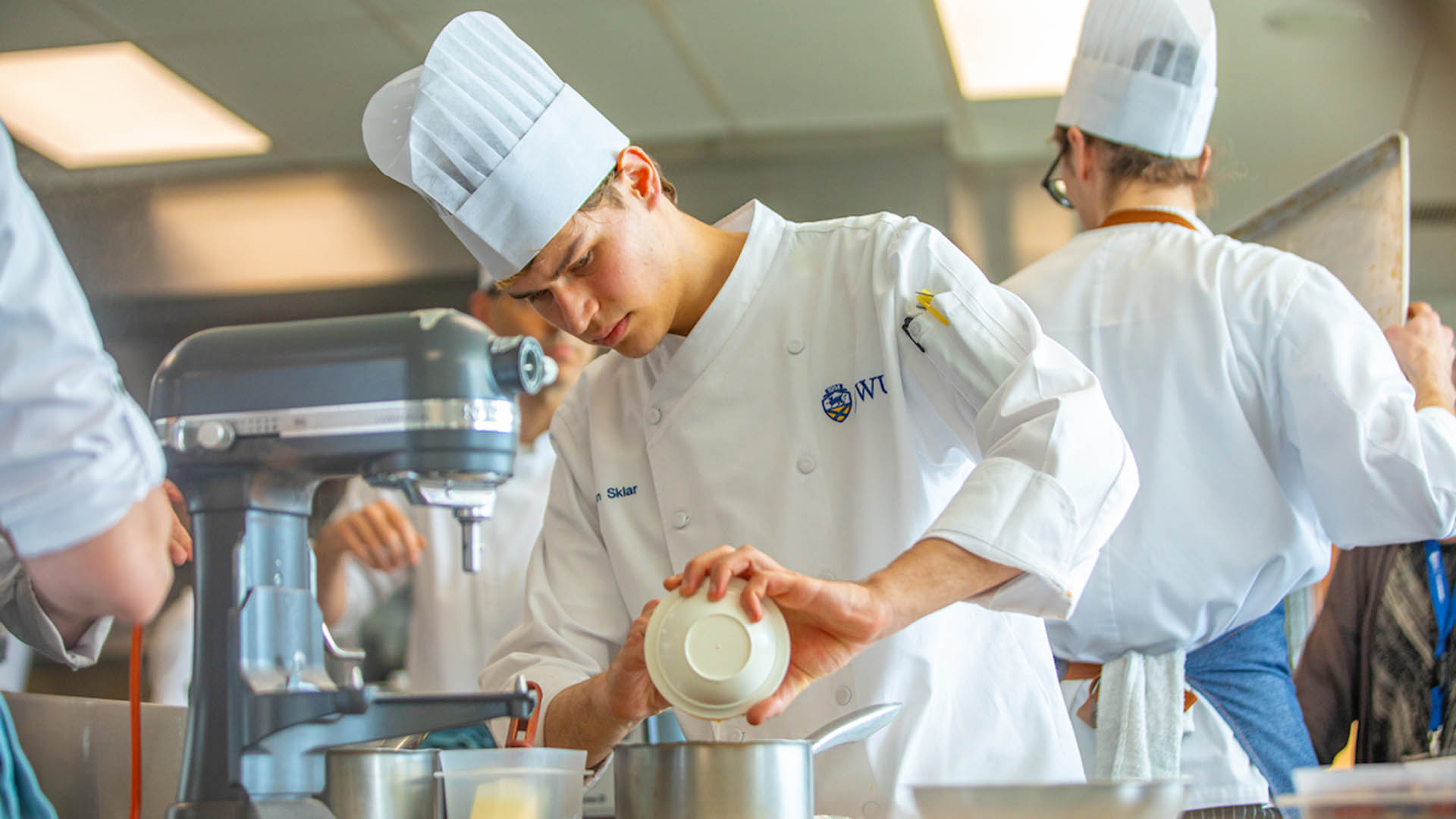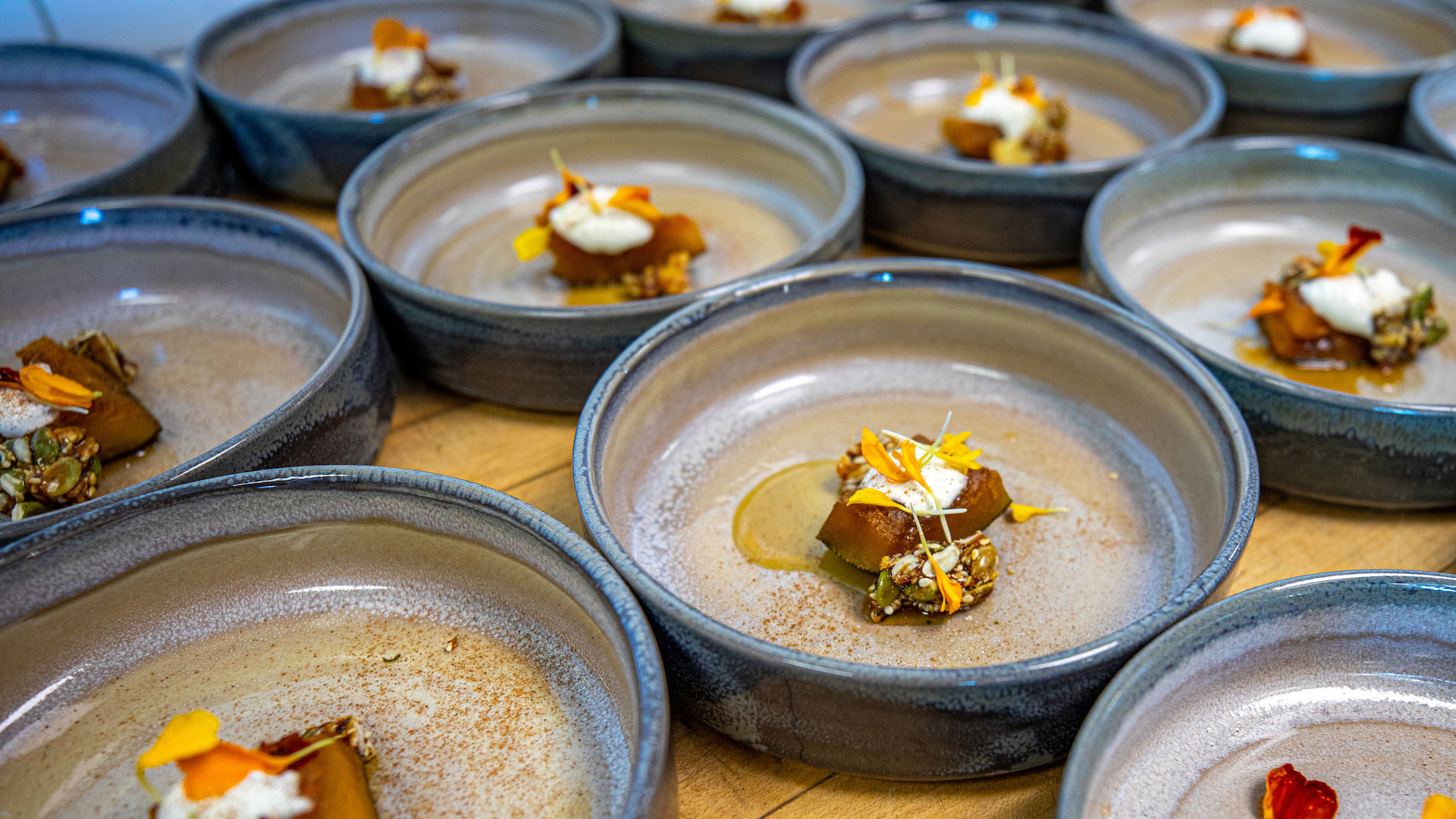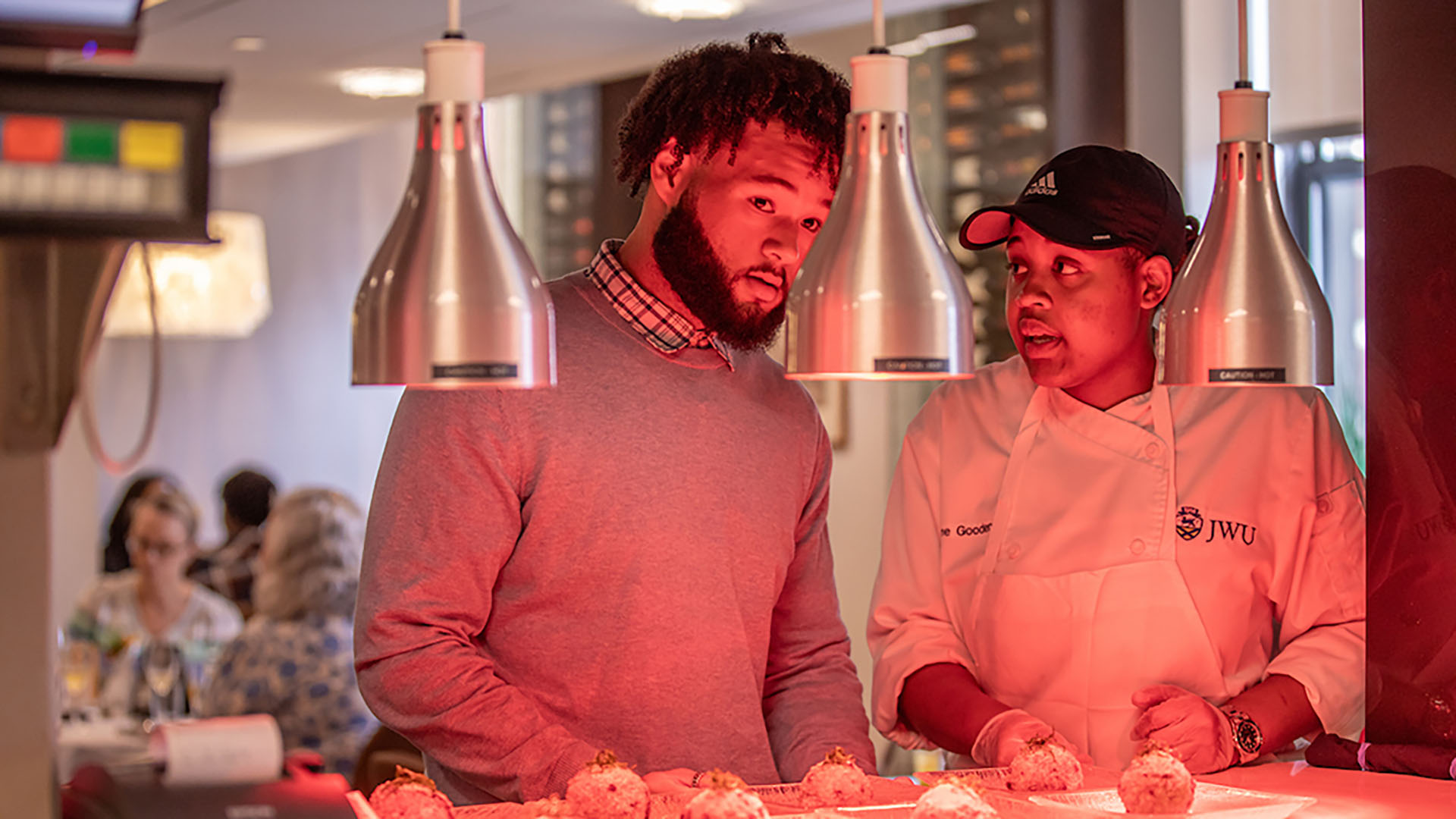Innovation, Creativity Drive the Bigelow ‘Super Bev’ Tea Competition
The health benefits of tea go well beyond its soothing properties. From lowering bad cholesterol to boosting our antioxidant levels and lowering inflammation — even improving our gut health, drinking a wide range of teas can have a lasting impact on your overall wellness. The Bigelow Tea Super Beverage Competition tasked JWU Providence College of Food Innovation & Technology (CFIT) and College of Hospitality Management (COHM) students with creating their own original beverages (both spirit-free and alcoholic) to accentuate tea’s healthy, functional and nutritious qualities.
Contestants were allowed to choose from a select group of teas from Bigelow Tea’s roster. Once they chose their tea or teas, they could experiment with, practice and refine their drink recipes during open lab drop-in times.
How to Make Ingredients Sing
As the competition got underway in the Cuisinart Center for Culinary Excellence Mixology Lab, the mocktails were up first.
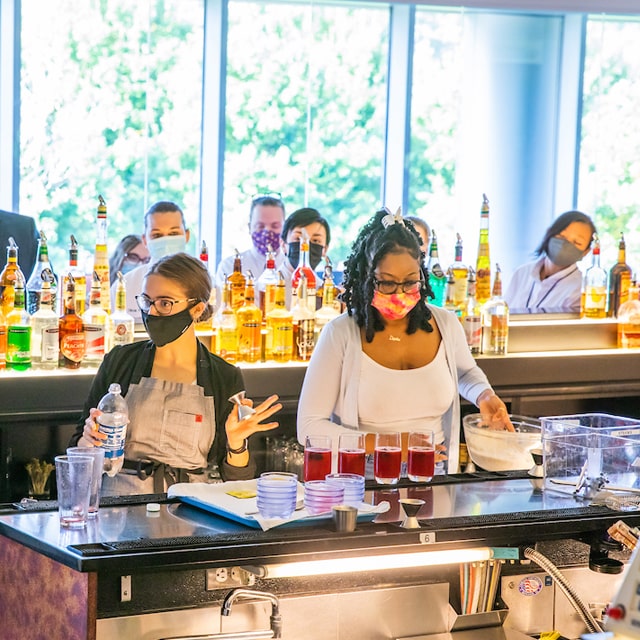 Emma Lundquist '21 and Celia Kinneary '23 used Bigelow Wild Blueberry with Açai infused with clover honey as their base tea. They then added a complex mix of juices, syrups, and garnishes to create “Purple Pineapple,” an antioxidant- and vitamin-rich concoction topped with a pineapple flower garnish and a dehydrated pineapple slice. Competition judge Cindi Bigelow '19 Hon. praised the way they handled the açai: “It can be tough to balance it out, but blending it with the clover honey was really delicious.”
Emma Lundquist '21 and Celia Kinneary '23 used Bigelow Wild Blueberry with Açai infused with clover honey as their base tea. They then added a complex mix of juices, syrups, and garnishes to create “Purple Pineapple,” an antioxidant- and vitamin-rich concoction topped with a pineapple flower garnish and a dehydrated pineapple slice. Competition judge Cindi Bigelow '19 Hon. praised the way they handled the açai: “It can be tough to balance it out, but blending it with the clover honey was really delicious.”
Olivia Fink '23 and Rebecca Grabon '23 highlighted Fall flavors in their drink, “Harvest Moon,” which brought an herbal Orange & Spice blend together with a deeply caramelized butternut squash syrup and other herbal notes (including freshly-grated cinnamon).
“The care you all took with this — the passion and energy — is motivational.”
Cameron Carden '22 and Kamryn Kohler '22 brought out the florals in their drink, “Blissful Berry.” Using Bigelow’s Lavender Chamomile tea, they muddled a blend of blueberries, basil, honey simple syrup, and lemon juice in to a shaken drink topped with elderflower tonic water and lemon-basil ice cubes.
Red Acker '22’s “Orange Dream” utilized aquafaba, the leftover liquid from canned chickpeas, to give an oatmilk foam the structure of a dairy milk foam. The resulting latte-style drink was the only warm drink of the competition, with notes of toasted orange and cinnamon. Cindi Bigelow commented that she’d never tried aquafaba before, adding: “You picked great ingredients to support the tea. It’s healthy and delicious, and it’s balanced perfectly.”
WATCH THE COMPETITION RECAP VIDEO BELOW:
Fun with Syrups, Foams & Tonics
Interestingly, every spirit-forward drink utilized gin as their base spirit. Gins utilize a wide range of herbaceous flavor profiles, making them ideal for pairing with complementary tea flavors.
Angie Escalante '22 chose Empress 1908 gin, a unique distillate with butterfly pea flowers, to create “Bigelow Blueberry Butterfly Empress.” Muddled blueberries, lemon juice and cold brewed Wild Blueberry with Açai tea made for an antioxidant-rich cocktail. As she put it, “I’m going to do everything everyone else did, but with booze! It’s 5 o’clock somewhere!”
Benjamin Walko '22 used locally-foraged ingredients to create the “New England Tonic” that formed the base of his “Boston G & Tea Party.” “I picked the sumac, dandelion, and sassafras (a natural pain killer) near my house,” he explained. “I wanted to do something that wasn’t just healthy for me, but healthy for the environment — they go hand-in-hand.”
Jordan Weber '23 and Deandra Ballantine '23 also utilized aquafaba as a topper for their “Blackberry Gin Fizz.” “Plant-based recipes are on the rise, so we thought it would be fun to incorporate the aquafaba as a foam,” Ballantine explained. “Plus you get a cute little aquafaba mustache when you drink it,” quipped Weber. The duo added blackberries to boost the natural probiotics in their base tea (Bigelow Lavender-Chamomile Herbal Tea); they also brewed the tea on the strong side — “to make it sing.”
Asia Vo '23 and Maya Alderman '23 drew on their Vietnamese and Japanese heritage, respectively, to create a gin-forward take on the London Fog, the “Sa Pa Fog.” “Sa Pa is a Vietnamese city that’s shrouded by fog, so we wanted to make that come through in our drink presentation,” explained Vo. They chose Roku Gin, a Japanese-style gin with notes of sakura blossom, yuzu peel, and sanshō pepper, and blended it with Bigelow Jasmine tea, ginger syrup, and a frothed coconut milk “fog.” “Jasmine tea and ginger work to boost brain function, making it a great before-class drink — maybe hold off on the gin!” quipped Vo.
Demonstrating Beverage Innovation
Prior to announcing the winners, Cindi Bigelow praised all of the contestants for their creativity and unique approaches to the assignment. “The care you all took with this — the passion and energy — is motivational,” she told them. “I’ll take this back to my R&D (research and development) team at Bigelow.”
Then the winners were announced: “Purple Pineapple” on the spirits-free side, and the “BBB Empress” on the alcohol side. Food & Beverage Management Department Chair Michael Sabitoni congratulated all the contestants and told Emma Lundquist, Celia Kinneary and Angie Escalante that they would be accompanying him to the 2022 National Restaurant Association Show in Chicago, Illinois.
In the afternoon, Cindi Bigelow joined Interim Dean Jennifer Galipeau, Ed.D, Department Chair Sabitoni and their College of Hospitality Management colleagues to dedicate the Bigelow Tea Beverage Lab, located in the Xavier Academic Center. It was a perfect way to celebrate 50 years of the COHM, which was established in 1971.
Explore Culinary, Hospitality & Food-Related Programs
Life Lessons in Leadership from Cindi Bigelow
TOP: THE DRINK FINALISTS, ALL IN A ROW. TOP RIGHT: JORDAN WEBER '23 AND DEANDRA BALLENTINE '23 MAKING THEIR “BLACKBERRY GIN FIZZ.” BELOW: THE CONTESTANTS AND JUDGES LINE UP FOR A GROUP SHOT. THE JUDGES, LEFT-RIGHT, ARE: CINDI BIGELOW ’19 HON., PRESIDENT AND CEO OF BIGELOW TEA; FRANK MARTUCCI, DIRECTOR OF BEVERAGE & NIGHTLIFE AT BALLY’S CORPORATION; JWU COHM PROFESSOR JAMES E. GRIFFIN, ED.D., CEC, CCE, CHE; JWU CFIT INSTRUCTOR THOMAS CHOICE. BOTTOM: ASIA VO '23 AND MAYA ALDERMAN MAKING THEIR “SA PA FOG” DURING THE COMPETITION. ALL PHOTOS BY MIKE COHEA.
